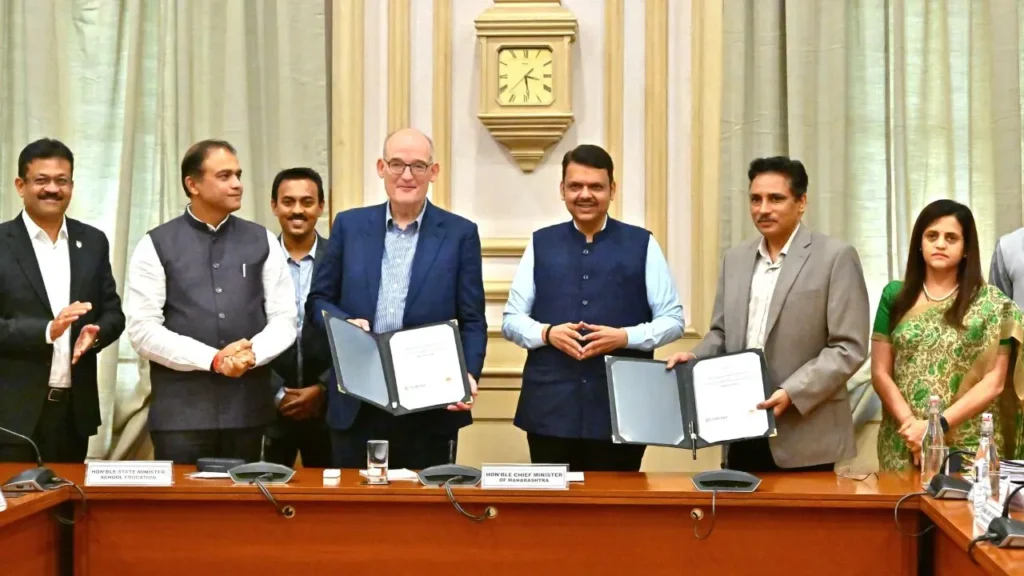Nagpur witnessed a landmark moment this week as Maharashtra signed a Memorandum of Understanding (MoU) with Cambridge University Press and Assessment India. The initiative, hailed by Chief Minister Devendra Fadnavis as a “historic leap,” is not just an agreement on paper but a vision to reshape how children across the state experience education.

At the heart of this partnership lies a promise: to bring international best practices into classrooms where, until now, many students have had limited exposure to global standards. For decades, children in rural Maharashtra have often studied from outdated books, while urban schools have raced ahead with advanced learning tools. This collaboration, officials insist, will bridge that divide.
Cambridge’s role will go beyond supplying resources. The organization will offer subject-specific training for teachers, digital learning modules, and globally recognised certification programmes such as CELTA and IKI. These programmes are designed not only to boost teaching quality but also to instill confidence in both teachers and students. “Education is no longer about rote learning,” said one official at the ceremony. “It’s about preparing children for an interconnected, digital world.”
One of the most innovative aspects of the MoU is the integration of “Climate Quest,” a curriculum focused on climate awareness and sustainability. In a state where farmers struggle with droughts and floods, bringing climate education into schools could help future generations understand and respond to environmental challenges more intelligently. Alongside this, Cambridge will provide early childhood curriculum support, ensuring that even the youngest learners benefit from this global exposure.
Teachers, too, stand at the centre of this transformation. With access to international training, they will gain tools to make classrooms more engaging and less exam-oriented. As School Education Minister Pankaj Bhoyar noted, “The partnership will nurture a new generation of students who not only excel academically but also think critically and lead with values.”
The signing ceremony itself reflected the weight of this initiative. Present were senior officials from the state’s education department, including Principal Secretary Ranjit Singh Deol and SCERT director Rahul Rekhawar, alongside Cambridge representatives. Roderick Smith, Managing Director of Cambridge International Education Group, described the partnership as “a bridge between Maharashtra’s vast pool of talent and Cambridge’s century-old expertise in shaping global learners.”
For parents, particularly those from modest backgrounds, this announcement carries immense hope. A mother from Nagpur, whose daughter studies in a government-aided school, expressed her optimism: “We always wanted our child to learn like students in big cities or abroad. If these resources really reach our school, it will change her future.” Such voices highlight the potential social impact of this agreement—education as a leveller of opportunity.
The timing of the MoU also aligns with India’s broader educational reforms under the National Education Policy (NEP). By emphasizing skills, creativity, and holistic learning, the NEP seeks to move away from rigid memorisation. Maharashtra’s tie-up with Cambridge is a concrete step in that direction, making global-standard resources accessible not just to elite schools but also to government institutions.
Chief Minister Fadnavis underscored this very point. “After NEP, Prime Minister Modi opened doors for international-level education. With Cambridge’s strength added to Maharashtra’s system, our children—whether in villages or cities—will now study with the same confidence as their global peers.” He assured that he would personally monitor the implementation to ensure the initiative doesn’t remain limited to select pockets but reaches every classroom.
Of course, challenges remain. Effective rollout will require robust infrastructure, digital access in remote areas, and consistent teacher training. Experts caution that without careful execution, such ambitious partnerships risk becoming symbolic. But the government has promised to invest resources and energy into making the collaboration meaningful.
Beyond policies and programmes, what stands out is the spirit behind this initiative. It reflects a recognition that the world is changing rapidly, and Indian students cannot afford to be left behind. Global-standard education is not about replacing local culture or values but enriching them with skills and perspectives that prepare students for the future.
As the event concluded, one line from Minister Bhoyar captured the day’s sentiment: “This is not just an MoU—it is a promise to every child in Maharashtra that their dreams are valid, their potential is limitless, and their future is global.”
If implemented with care and commitment, this partnership could indeed redefine the educational journey of millions, setting Maharashtra on a path where every child, regardless of background, studies not just for exams but for life in a world
Do Follow: https://www.cambridge.org